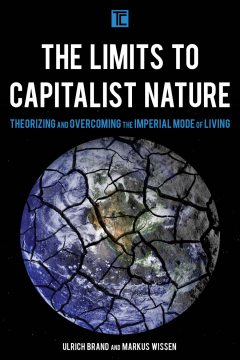
Additional Information
Book Details
Abstract
The book provides for a historical-materialist understanding of the multiple crises of capitalism, focusing on the ecological crisis and its interaction with other crisis phenomena (financial crisis, crisis of democracy, economic crisis). Drawing on political ecology, Gramscian theory of hegemony, critical state theory and the regulation approach, it introduces the concept of an imperial mode of living in order to better understand the everyday practices and perceptions as well as the social relations of forces and institutional constellations that facilitate environmentally destructive patterns of production and consumption. Furthermore, it develops a historical-materialist critique of the green economy concept that has been propagated in recent years as a solution not only for the ecological but also for the economic crisis. Finally, the book proposes a democratisation of societal nature relations as a way out of the crisis that requires overcoming capitalist property relations and the exclusive forms of controlling nature guaranteed by them.
Everybody who wants to know why and how contemporary capitalist societies are so unsustainable, why a Great Transformation is such a big challenge, but also which alternative strategies do already exist, should read this book. It provides a powerful explanation as to why the current mode of production and living is socially unjust, ecologically disastrous and a major obstacle for an attractive future.
Christoph Görg, Professor of Environmental Governance, Helmholtz Centre for Environmental Research
How and why does capitalism ceaselessly exploit the biophysical world yet remain resilient in the face of its manifest failures? Through their concept of the 'imperial mode of living' the authors show how the destructive forces of capitalism become, paradoxically, opportunities not only for political opposition but for capitalism itself. A battery of organisation, geographical and ideological manoeuvres allow the ecological limits to capitalism to be continuously overcome. Leveraging off these limits is the necessary work of capitalism's many opponents.
Noel Castree, Professor of Geography, University of Manchester
Brand and Wissen’s remarkable synthesis of political sociology and political ecology tells how a hegemonic mode of consumption regulates society-nature relations under a newly emergent 'internationalised state’. If you want to know why global environmental crisis stems from 'the imperial way of living'; why financialization and the green economy stops its effective management; and why participatory socio-ecological transformation is urgent, then this is your book.
Ariel Salleh, Political Economy, University of Sydney, author of Ecofeminism as Politics
This book has breakthrough appeal. It cuts through a thick layer of ideology around the crises of the societal relationships with nature in an age of climate change. Its innovative and precise core concept of 'the imperial mode of living' reveals the chief contradictions of daily life in neoliberalism and is a crucial contribution to current debates on the Capitalocene.
Roger Keil, Professor in the Faculty of Environmental Studies, York University
Brand and Wissen offer an innovative perspective on the limits of capitalist nature. The book is an important addition to the literature on the eco-social transformation of contemporary capitalism. Scholars, students and activists should read it.
Max Koch, Professor in Social Policy, Lund University
Ulrich Brand is Professor of International Politics at the University of Vienna.
Markus Wissen is Professor of Social Science at the Berlin School of Economics & Law.
Table of Contents
| Section Title | Page | Action | Price |
|---|---|---|---|
| The Limits to Capitalist Nature | Cover | ||
| Contents | vii | ||
| Acknowledgements | ix | ||
| 1 Theorizing the Imperial Mode of Living: An Introduction | 1 | ||
| 2 The Crisis of Global Environmental Politics and the Imperial Mode of Living | 9 | ||
| 3 Crisis and Continuity of Capitalist Societal Nature Relations | 23 | ||
| 4 Strategies of a Green Economy, Contours of a Green Capitalism | 39 | ||
| 5. The Valorization and Financialization of Nature as Crisis Strategy | 53 | ||
| 6. Socio-Ecological Transformation as the Horizon of a Practical Critique of the Imperial Mode of Living | 71 | ||
| 7. Towards the Democratization of Societal Nature Relations | 85 | ||
| 8 Overcoming the Imperial Mode of Living: Political and Strategic Implications | 97 | ||
| Notes | 107 | ||
| References | 113 | ||
| Index | 137 | ||
| About the Authors | 141 |
